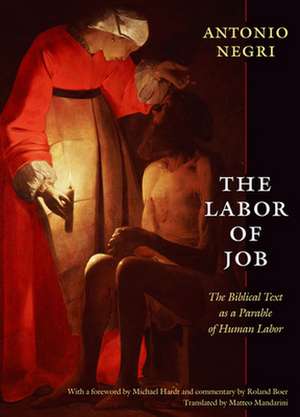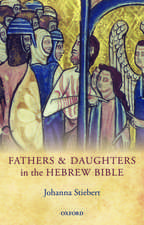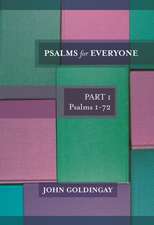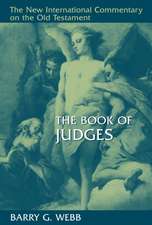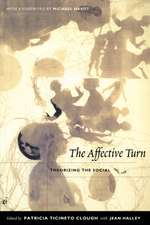The Labor of Job – The Biblical Text as a Parable of Human Labor: New Slant: Religion, Politics, Ontology
Autor Antonio Negri, Matteo Mandarinien Limba Engleză Paperback – 23 noi 2009
Preț: 184.53 lei
Nou
Puncte Express: 277
Preț estimativ în valută:
35.31€ • 36.64$ • 29.52£
35.31€ • 36.64$ • 29.52£
Carte tipărită la comandă
Livrare economică 17-31 martie
Preluare comenzi: 021 569.72.76
Specificații
ISBN-13: 9780822346340
ISBN-10: 0822346346
Pagini: 168
Dimensiuni: 155 x 215 x 11 mm
Greutate: 0.23 kg
Editura: MD – Duke University Press
Seria New Slant: Religion, Politics, Ontology
Locul publicării:United States
ISBN-10: 0822346346
Pagini: 168
Dimensiuni: 155 x 215 x 11 mm
Greutate: 0.23 kg
Editura: MD – Duke University Press
Seria New Slant: Religion, Politics, Ontology
Locul publicării:United States
Cuprins
Contents; Foreword: Creation beyond Measure; Michael Hardt; Preface to the 2002 Edition; Introduction; 1. The Difference of Job; 2. Of the Absoluteness of the Contingent; 3. The Adversary and the Avenger; 4. The Chaos of Being; 5. The Dispositif of the Messiah; 6. The Constitution of Power; 7. Ethics as Creation; Commentary: Negri, Job, and the Bible; Roland BoerBibliographical Appendix; Index
Recenzii
Antonio Negri takes the ideas he developed in reading Spinoza, the Jewish heretic, and brings them to bear on one of the most crucial texts of orthodox Christianity to show how much unrealized potential for radical change persists even within those theoretical formations that seem the most monolithic and reactionary. Negris approach prefigures efforts by philosophers such as Slavoj iek, Alain Badiou, and Giorgio Agamben to re-read the history of Christian thought against the grain.Timothy S. Murphy, co-editor of The Philosophy of Antonio Negri Job regards God, according to Negri, not as judge or father or even as the source of discipline and mediation, but merely as antagonist, the locus of an empty, unjust command. There is no more question of measureequating sins and punishment or virtues and rewardsthat could support a conception of divine justice. But Job is not powerless. . . . According to Negris reading he stands before God angry, indignant, unrepentant, and rebellious.from the foreword by Michael Hardt, co-author, with Antonio Negri, of Empire and Multitude
"Antonio Negri takes the ideas he developed in reading Spinoza, the Jewish heretic, and brings them to bear on one of the most crucial texts of orthodox Christianity to show how much unrealized potential for radical change persists even within those theoretical formations that seem the most monolithic and reactionary. Negri's approach prefigures efforts by philosophers such as Slavoj eiuek, Alain Badiou, and Giorgio Agamben to re-read the history of Christian thought against the grain."--Timothy S. Murphy, co-editor of The Philosophy of Antonio Negri "Job regards God, according to Negri, not as judge or father or even as the source of discipline and mediation, but merely as antagonist, the locus of an empty, unjust command. There is no more question of measure--equating sins and punishment or virtues and rewards--that could support a conception of divine justice. But Job is not powerless... According to Negri's reading he stands before God angry, indignant, unrepentant, and rebellious."--from the foreword by Michael Hardt, co-author, with Antonio Negri, of Empire and Multitude
"Antonio Negri takes the ideas he developed in reading Spinoza, the Jewish heretic, and brings them to bear on one of the most crucial texts of orthodox Christianity to show how much unrealized potential for radical change persists even within those theoretical formations that seem the most monolithic and reactionary. Negri's approach prefigures efforts by philosophers such as Slavoj eiuek, Alain Badiou, and Giorgio Agamben to re-read the history of Christian thought against the grain."--Timothy S. Murphy, co-editor of The Philosophy of Antonio Negri "Job regards God, according to Negri, not as judge or father or even as the source of discipline and mediation, but merely as antagonist, the locus of an empty, unjust command. There is no more question of measure--equating sins and punishment or virtues and rewards--that could support a conception of divine justice. But Job is not powerless... According to Negri's reading he stands before God angry, indignant, unrepentant, and rebellious."--from the foreword by Michael Hardt, co-author, with Antonio Negri, of Empire and Multitude
Textul de pe ultima copertă
"The book of Job is the first (and, in many ways, still unsurpassed) exemplary case of the critique of ideology, teaching us how to resist legitimizing our misfortunes with any kind of 'deeper meaning'--and who is more suitable to actualize this book for our times as Antoni Negri? In his hands, The book of Job turns into a revolutionary text, into a true manual of resistance."--Slavoj Zižek
Notă biografică
Descriere
A reinterpretation of the biblical story by one of the world's foremost marxist intellectuals
